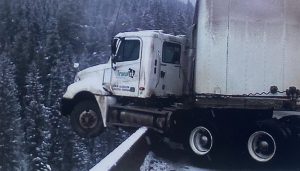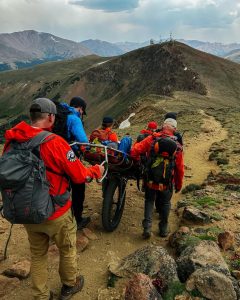With winter looming, Colorado’s chain law and passenger vehicle traction law are now in effect
The laws require drivers on Interstate 70 and other mountain roadways to carry chains or other traction devices
Colorado’s chain law and passenger vehicle traction law took effect this month as the potential for snow in the High Country increases.
Snow is not unusual this time of year in the mountains. That’s why the chain law and passenger vehicle traction law are in effect each year from Sept. 1 to May 31, according to a news release from the Colorado State Patrol.
“Whether a tractor-trailer or a four-door sedan, snow and ice conditions impact your drive,” State Patrol Chief Col. Matthew Packard said in a statement. “If carrying chains or checking your tire tread seems like a hassle, imagine the inconvenience of sitting in traffic due to a crash or being rerouted miles out of your way due to highway closures.”
Colorado’s chain law requires that all vehicles be prepared with adequate tires and equipment when traveling during the winter.
Under state law, all vehicles under 16,000 pounds traveling on any portion of Interstate 70 between Morrison and Dotsero must carry tire chains for two or more tires, an approved alternate traction device or tires with a tread depth of at least three-sixteenths of an inch rated for either “all weather” or “mud and snow.” Drivers could receive a $50 fee with a $17 surcharge for failing to comply with this law, according to the State Patrol.
State law also requires commercial vehicles and buses to carry chains or an approved alternative traction device regardless of current weather on I-70 west of Morrison, on Colorado Highway 9 between Frisco and Fairplay, on U.S. Route 40 west of Empire and U.S. Route 50 west of Salida.
The State Patrol will hold its first commercial vehicle chain-check operation on I-70 near Dotsero on Thursday, the release states. The chain checks are held even when the weather is not expected to be inclement to help ensure that commercial and private drivers are prepared at all times, according to the State Patrol.

Support Local Journalism

Support Local Journalism
As a Summit Daily News reader, you make our work possible.
Summit Daily is embarking on a multiyear project to digitize its archives going back to 1989 and make them available to the public in partnership with the Colorado Historic Newspapers Collection. The full project is expected to cost about $165,000. All donations made in 2023 will go directly toward this project.
Every contribution, no matter the size, will make a difference.









